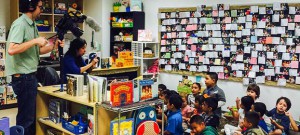
Representatives from PBS News Hour film students at Mistral Early Childhood Center for an upcoming segment on refugee students.
Children who have fled their native countries due to war, drug-related violence, or other conflicts often need special types of support once they arrive in the United States.
That’s why two organizations came to HISD this week to learn more about how the district is assisting its refugee students. Representatives from Raise Your Hand Texas visited two campuses — Daily Elementary School and Westside High School — while producers from PBS News Hour spoke with leaders at Mistral Early Childhood Center (ECC) and Las Americas Newcomers School.
“The Houston area gets about 3,000–4,000 refugees annually,” explained Shirin Herman, a trainer with HISD’s Multilingual Education department. “We do a few trainings a year so that teachers and staff will know where people are coming from and what kind of conditions they’re fleeing. Parents get an orientation through the district’s Refugee Program, and students are provided with a free backpack, school supplies, and a dictionary — sometimes even before they enroll. HISD also works closely with a number of private non-government agencies to provide free English classes, temporary housing, food stamps, Medicaid, and job support.”
Marie Moreno, principal of Las Americas, said that her school has incorporated a trauma-sensitive curriculum so that teachers know how to recognize signs of it in student behavior, whether through violence, aggression, extreme shyness, or sudden emotional outbursts. “That way, teachers know how to work with these kids and can help calm their anxiety.”
Moreno also has representatives from Children at Risk come in twice a week to help students learn coping skills and how to relate to one another. “Sometimes, you have to teach kids how to act in a school setting because they’ve never been in one. And when kids do act out, we redirect them, but we also explain why. For us, it’s about correcting behaviors instead of just giving detentions.”
Moreno noted that PBS’s interest likely stemmed from an article published in May that touches on this same subject and mentions both Las Americas and Mistral by name.